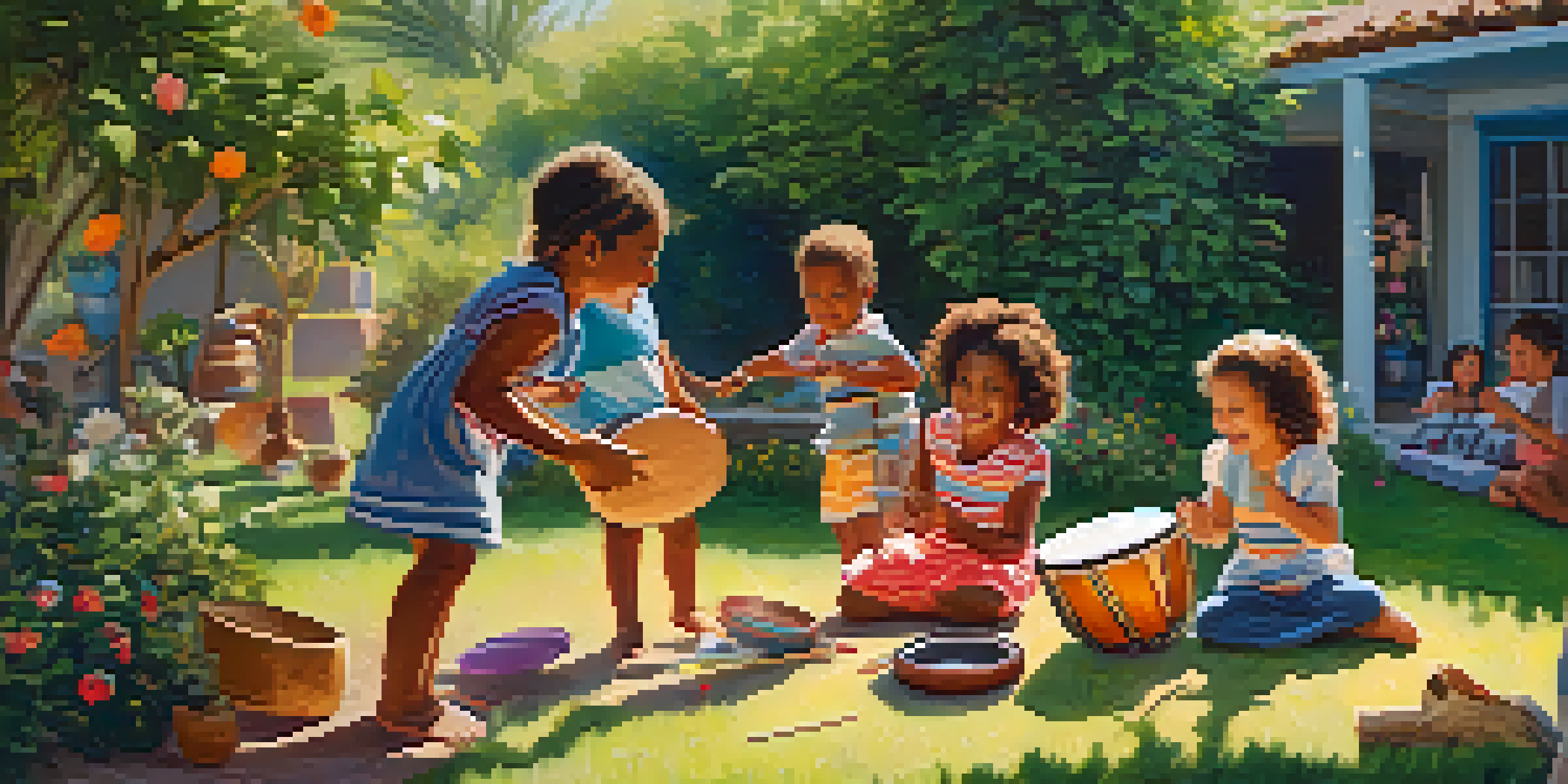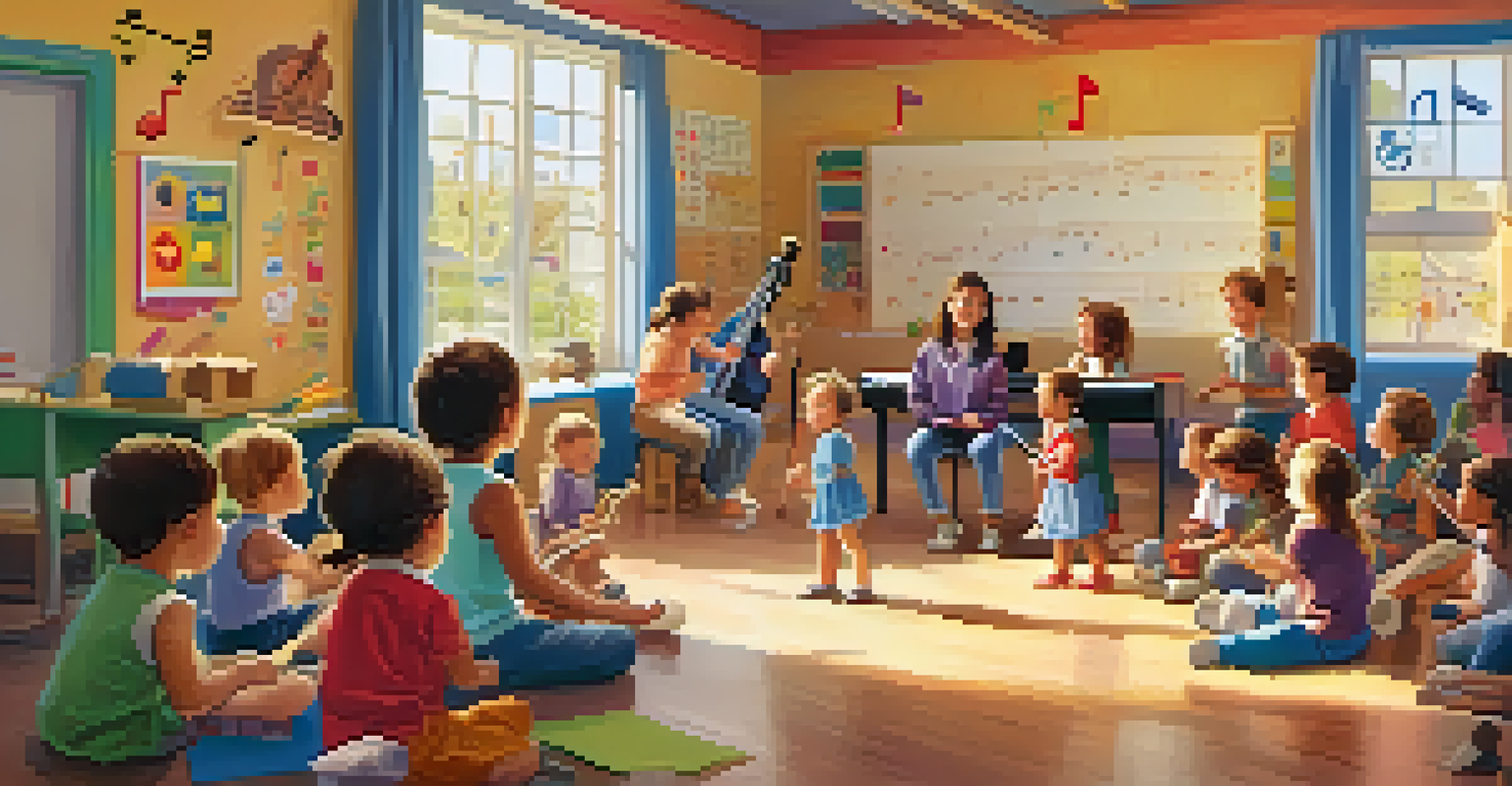Music and Play: Encouraging Exploration in Young Children

The Importance of Music in Early Childhood Development
Music plays a vital role in the development of young children. It stimulates various areas of the brain, enhancing cognitive, emotional, and social skills. When children listen to music or engage in musical activities, they develop a sense of rhythm, which is foundational for language and literacy skills.
Music can change the world because it can change people.
Incorporating music into daily routines can also improve memory and attention span. For example, singing songs while washing hands or cleaning up can make these tasks enjoyable and memorable. This playful approach not only reinforces learning but also builds a positive association with everyday activities.
Moreover, music encourages children to express themselves creatively. Whether they are dancing, singing, or playing instruments, these activities allow them to explore their emotions and communicate in ways words sometimes cannot. This self-expression is crucial for their overall emotional well-being.
Play as a Catalyst for Learning
Play is often seen as just fun, but it is crucial for learning, especially in young children. Through play, children explore their surroundings, test boundaries, and develop problem-solving skills. This active engagement with the world around them lays the groundwork for critical thinking and adaptability.

Different types of play, such as imaginative play, enable children to role-play various scenarios, enhancing their understanding of social dynamics. For instance, when children play 'house,' they learn about family roles and cooperation. This type of play can be enriched with music, further enhancing their social learning.
Music Enhances Child Development
Engaging with music stimulates cognitive, emotional, and social skills in young children.
Additionally, play promotes physical development. Activities like dancing or playing musical games not only keep children active but also improve their coordination and motor skills. This physical engagement is essential for growing bodies and helps instill a lifelong love for movement.
Combining Music and Play for Deeper Learning
Combining music and play creates a rich environment for exploration. When children engage in musical play, they can experiment with sounds, rhythms, and movements, fostering a sense of curiosity. This exploration can lead to unexpected discoveries, such as creating a new sound by combining different instruments.
Play is the highest form of research.
For example, consider a simple game where children use pots and pans as drums while singing along to a familiar tune. This activity not only makes music interactive but also encourages teamwork and collaboration. Children learn to listen and respond to one another, building important social skills.
Moreover, integrating music with other forms of play can enhance learning across disciplines. By incorporating songs that teach numbers or letters, children can learn foundational academic skills in a playful manner. This fusion of music and play supports holistic development, making learning enjoyable.
Encouraging Exploration Through Musical Instruments
Introducing musical instruments to young children can spark their interest and creativity. Simple instruments like tambourines or maracas are perfect for little hands and can create a world of sound. Allowing children to explore these instruments fosters a sense of ownership and encourages them to experiment freely.
As they play, children can develop fine motor skills and hand-eye coordination. For instance, shaking a maraca requires them to coordinate their movements, enhancing their physical abilities. This exploration is not just about making noise; it’s a fundamental part of their growth and learning.
Play Fuels Learning and Growth
Play is essential for exploring, problem-solving, and developing critical thinking skills.
Furthermore, playing instruments together creates a sense of community. Group music sessions can lead to collaborative play, where children learn to share and cooperate. These shared experiences strengthen social bonds and teach valuable lessons about teamwork and communication.
Creating a Music-Friendly Environment at Home
To encourage exploration, it's essential to create a music-friendly environment at home. This can be as simple as having a designated space filled with various instruments and musical toys. Encouraging your child to explore these resources freely can lead to spontaneous musical moments.
Incorporating music into daily life can also enhance this environment. Consider playing different genres of music during meals or playtime. This exposure not only introduces children to diverse sounds but also helps them develop a broader appreciation for music.
Moreover, engaging in music together can strengthen family bonds. Singing songs, dancing, or even creating musical games together fosters quality time and shared experiences. These moments are not only enjoyable but also crucial for building a supportive and nurturing atmosphere.
The Role of Educators in Music and Play
Educators play a pivotal role in integrating music and play in early childhood settings. By incorporating musical elements into lessons, they can create a dynamic learning environment that captivates young minds. Educators can use songs and games to teach various subjects, making learning more engaging.
Training educators to recognize the importance of music in play can lead to more innovative teaching methods. For instance, a lesson on nature can be enhanced with songs about animals, making the learning experience more relatable and enjoyable for children. This approach reinforces concepts and fosters a love for learning.
Collaboration Through Musical Play
Integrating music and play fosters teamwork and enhances social bonds among children.
Additionally, educators can encourage parents to be involved in their child's musical exploration. By providing resources and suggestions for musical activities at home, they can create a consistent learning experience. This collaboration between home and school is vital for nurturing a child's curiosity and passion for music.
The Lasting Impact of Music and Play on Development
The benefits of integrating music and play extend beyond childhood. Children who engage in these activities often develop enhanced cognitive abilities, emotional intelligence, and social skills that serve them well into adulthood. This early foundation can create lifelong learners who embrace creativity and exploration.
Moreover, the memories created during musical play can last a lifetime. The songs sung and the games played often become cherished memories that shape a child’s identity and interests. These experiences can inspire future passions, whether in music, dance, or other creative fields.

Ultimately, fostering a love for music and play in young children cultivates a sense of curiosity and wonder about the world. By encouraging exploration through these mediums, we are equipping the next generation with the tools they need to thrive, think critically, and appreciate the beauty of creativity.